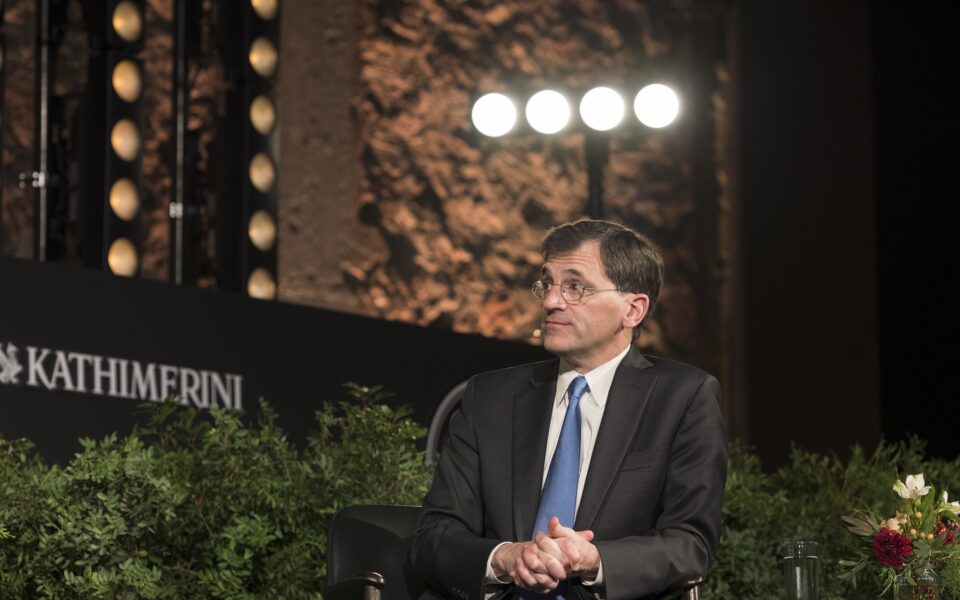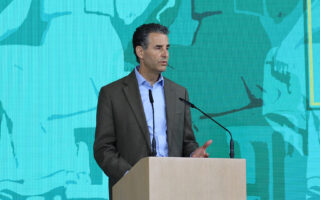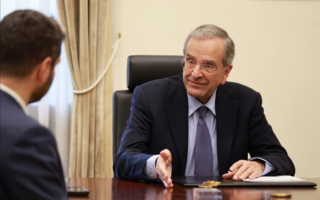America lost the ‘moral high ground’ on January 6
NYT White House correspondent Peter Baker talks about Trump’s impact on US standing

Donald Trump’s behavior has been a blight on American democracy and on the United States’ ability to exert influence over the rest of the world, The New York Times’ chief White House correspondent Peter Baker tells Kathimerini.
The well-known journalist, who has Greek roots, also stresses that US President Joe Biden’s support for Israel as the war continues to rage in Gaza has harmed his image among young Democrats, while on the matter of Ukraine, he notes that it may end with a “dirty solution” of Russian territorial gains.
Baker also sheds light on how Greece is viewed in Washington, noting that its image has improved significantly in the past decade and that it “punches above its weight” as a “reliable partner” in the region, wielding influence that is disproportionate to its size. He adds that this is, in part, due to the role played by some “very influential important people of Greek descent” in Washington.
Let’s start with your life. You’re Greek from your father’s side.
Yes, my father’s side. My grandfather was born in Asia Minor somewhere in the north, probably near Ankara, in 1892 and he left in 1908. He didn’t want to be drafted into the Turkish Army. He makes his way to Alexandria, Egypt. He then gets into a boat from Paris to New York. He got there in 1909. He’s 17 years old. No skills, no money, a very classic story. He works his way through a lot of jobs, on the railroads, a chocolate maker at one point. And he meets my grandmother. She comes from Smyrna in 1935. They meet at a picnic in West Virginia of all places, which is where there’s actually a thriving Greek community. They were engaged two weeks later and they got married. My father grew up speaking Greek before English. He met my mother while he was at Harvard Law School. The classic story: The grandparents come with nothing, no education, no money, no skills, and then their son, my father, goes to Harvard Law School. I’m baptized into the Church, but we didn’t speak Greek at home. That’s one thing I regret. I wish he had taught me.
Fast-forward, you become the chief White House correspondent for the NYT. Let me start with Trump and his nonacceptance of the results in 2020. How does this compare to 2000 and Al Gore, who was gracious?
The reaction in the two cases was radically different. You had in [George W.] Bush and Gore first of all a contest that was genuinely uncertain, it came down to one state. The final difference was 537 votes out of 100 million nationally. And so you had a genuine question about who had won and they went through the process, they had three recounts and they had lawsuits. And at some point the Supreme Court said, “OK, enough of the recounting,” and Gore accepted the verdict. He didn’t like it, but he gave a very gracious speech, as you said, and he stated that “President Bush is now our president and we have to do everything we can to make him successful,” and President Bush gave a very gracious speech himself, saying, “I’m not going to be a president just for Republicans, but for all Americans,” and that’s the way the system worked. It was a bitter moment for the Democrats, but it worked and the more important thing is that they all trusted the system.
A very different situation in 2020…
Yes. There they tried to tear the system down. The election was not at all close. Trump would have had to overturn the election in three different states in which he was thousands of votes behind. In some cases tens of thousands. So it’s not a close call. There’s zero reason to think that there was any kind of fraud of any consequence, none whatsoever. His own people told him that. His own attorney general told him that. His own campaign people told him that. And yet he propagated what we all know was a lie to the public and tried to change the outcome of the elections.
And in a way still does.
And still does. This is something Americans had never seen before, you know, we have not seen anything like that. We Americans believed for the longest time that our system was better and we did it better. We could never imagine this happening in the US. Well, it turns out it can happen and that’s a lesson to us.
‘It’s going to be a whole lot harder for Americans to lecture you or anybody else about democracy or constitutions and rule of law’
Can the US still pressure or encourage other countries the way it used to, being more democratic, given what happened on January 6?
It’s a lot harder. We don’t stand on the moral high ground that we once put ourselves on in writing. We probably were never there to begin with and we just thought that we were with an overconfidence of our own righteousness. Well, we’ve seen that that’s not the case and it’s going to be a whole lot harder for Americans to lecture you or anybody else about democracy or constitutions and rule of law, and that’s a shame actually because while I’m sure a lot of countries found it arrogant on the part of Americans, there was at least a benefit in standing up for principles that you know people – especially people who are dissenters in various systems – could hold onto and believe in. Now it’s a very cynical time. People around the world would say: “Why should we believe in your system? Your system is no better than ours.”
Let’s move to the practical situation on the ground, so to speak. What will happen in this election?
I will say it is clearly a much more competitive race than anybody would have imagined on January 7, 2021. If you had said that Donald Trump would not only be the runaway front-runner for his party’s nomination, but even leading in a general election contest, according to the polls, against Joe Biden, nobody would have taken you seriously. It turns out he’s much stronger than we realize. He has stronger support, but I think there is a ceiling on that support. He has not won over more people who voted against him the last time. People are not suddenly coming back to him, but he has kept the people he had before and not lost them, which is remarkable given the things that happened on January 6. The question for Biden is can he bring back the same people who voted for him, but otherwise might stay home because they aren’t happy for one reason or the other.
The impact of third-party candidates like Robert F. Kennedy Jr?
Kennedy is pulling from different sides. We don’t know who he hurts the most. He’s sort of an unknown character. And another question is will things stay the same by next November, when people will actually make decisions that matter?
Is Kamala Harris hurting the ticket?
Historically your vice-presidential running mate doesn’t change the outcome of an election for the most part. There were times when that happened. LBJ probably helped get JFK over the top because he did bring in Texas. Quayle was probably a drag on Bush as was Palin on McCain. Kamala, we don’t know yet. Too early to say.
Let’s turn briefly to foreign policy. Ukraine, Gaza, do they help or hurt Biden?
The Israel situation is obviously hurting him right now among young Democrats. The question is how long the war goes on and where we’re at in November of next year. Ιf the war is more or less over and they’ve moved on to some sort of a reconstruction and they’ve figured out a different way to handle Gaza, and maybe they’ve begun some sort of a peace initiative, it’ll look different than today.
And the war in Ukraine? In a recent interview with Tom Friedman he spoke of a possible “dirty solution.”
I can see a sort of dirty solution. I can’t imagine Biden putting pen to paper and saying, “We agree to this,” but it may be the reality on the ground. If Ukraine can’t take it back there’ll be a sort of a frozen situation for years to come and may even be a low-grade fighting situation. Maybe like Korea, where we have a technical armistice but no actual peace treaty, so I can see a scenario like that. It is not a very satisfying one because it rewards aggression, right? It rewards Putin for using force to redraw the borders in Europe, and that is a precedent that you do not want. Biden does not want to appear like he’s dictating that Ukraine should give up land, even if he may now think that that’s the ultimate outcome.
If Trump wins, would he pull out of NATO?
It’s very possible. But even if he didn’t, the value of Article 5 is gone, because Article 5 is based on the belief that everybody will adhere to it, especially the United States. If you don’t believe that the US is going to adhere to it then it’s not the deterrent that it has been for 75 years. If Putin doesn’t believe that the United States is going to come to the defense of Lithuania, Latvia and Estonia, he has an incentive to go ahead and try something. Trump has actually said, and we reported it in our book [“The Divider,” co-authored with Baker’s wife, Susan Glasser, staff writer and columnist at The New Yorker], “Why would I go after Putin to help Lithuania?” Putin is clearly watching and waiting to see. He has decided that he can wait out the Americans and see what happens next November. He doesn’t pay any cost right now for keeping the war going for another 11 months and he may not even have to wait that long.





